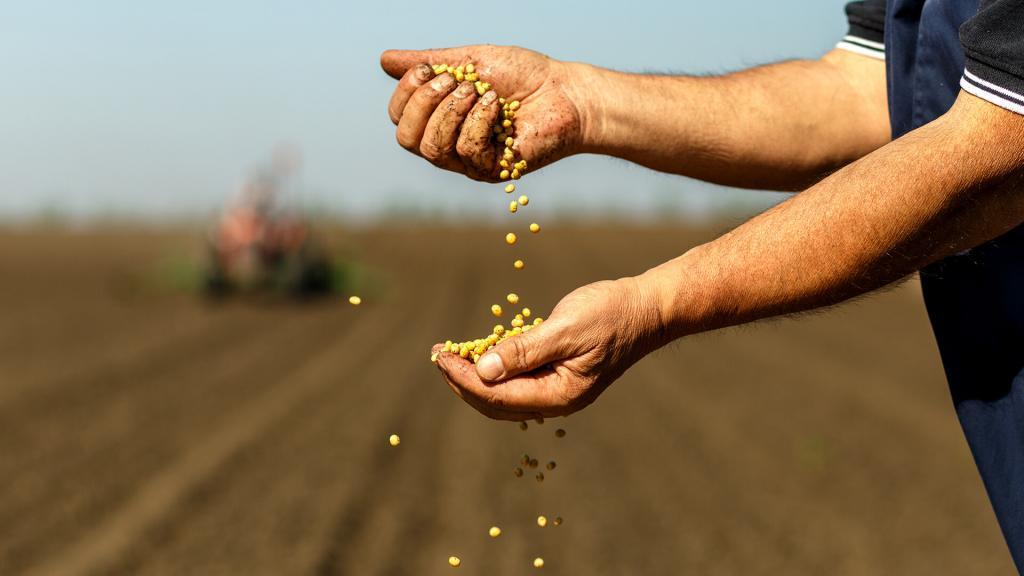Organic Seed Alliance (OSA), Farm Action, Open Market Institute, and National Sustainable Agriculture Coalition applaud a new report released today by the U.S. Department of Agriculture’s (USDA) Agricultural Marketing Service (AMS), More and Better Choices for Farmers: Promoting Fair Competition and Innovation in Seeds and Other Agricultural Inputs. The report is a response to a July 9, 2021, Executive Order, titled “Promoting Competition in the American Economy,” and includes findings from a 2022 public comment period and listening forum, and interviews and other investigative efforts.
The seed industry is one of the most consolidated sectors in agriculture, with just four companies controlling more than 60% of the commercial seed marketplace. As U.S. infrastructure for public plant breeding decreases, and more independent seed companies vanish, seed is increasingly concentrated in the hands of multinational firms to the detriment of American farmers and the communities they feed. There is an urgent need to rebalance the playing field between corporate players and independent growers, plant breeders, and seed companies. Thankfully, today’s report outlines critical strategies for injecting fairness back into our food and agriculture supply chain.
“The report released today is an historical effort to address long-standing problems in our highly consolidated seed marketplace,” says Kiki Hubbard, OSA’s director of advocacy. “Increasing fairness, transparency, and resiliency in U.S. agriculture are timely goals and we are grateful the USDA is putting the spotlight on seed, the first link in our food production chain.”
As today’s report notes, seed consolidation and intellectual property (IP) issues are complex and interrelated, spanning IP law, antitrust law, and public investments in our food system. Importantly, the USDA has identified opportunities for interagency coordination with the U.S. Patent and Trademark Office (USPTO), Department of Justice, and Federal Trade Commission to promote fair competition. Through coordination, these agencies will assess the impact of seed industry consolidation and IP rights on pricing, choice, and availability of plant varieties and the impact of reduced competition on food security, genetic diversity, and regional food systems.
Other steps USDA is taking include:
- USDA-AMS is establishing a Farmer Seed Liaison to ensure “a voice for farmers and plant breeders.” This position will facilitate communications between farmers, plant breeders, and relevant agencies that touch on the IP system to enhance the quality of the patent examination process and reduce confusion around seed IP rights. USDA is also expanding its FarmerFairness.gov portal to enable farmers and businesses to report tips and complaints related to competition and consumer protection in the seed marketplace.
- USDA is also partnering with USPTO on a new Working Group on Competition and Intellectual Property to collaborate on initiatives that enhance the transparency of IP information, including exploring potential research and plant breeder exemptions for U.S. utility patents.
- USDA is using its authority under the Federal Seed Act to ensure that farmers have access to the information they need through labeling requirements to make the best choices in the seed marketplace.
- USDA is identifying priorities for additional public plant breeding and seed system investments, including in crops and regions currently underserved by the private sector and through partnerships between public entities, non-profit organizations, and historically marginalized communities who are original stewards of many varieties.
In addition to the recommendations outlined in the report, our groups support a moratorium on new seed industry mergers and acquisitions attempted by the Big Three: Bayer-Monsanto, Syngenta-ChemChina, and Dow-DuPont. Currently, these dominant firms own and control large swaths of traits, germplasm, agrochemicals, and data platforms. Groups would also like to see coordinated initiatives to include retrospective reviews of these mergers and any impacts to farmers, competing firms, and other stakeholders. Finally, groups would like to see commercial cultivars developed with public dollars to remain in the public domain free of restrictions on seed-saving, research, and breeding.
“Consolidation in the seed sector has had devastating impacts: Farmers are exploited by corporate designs, consumers have less choice, and the death of innovation could spell starvation for future generations,” says Sarah Carden, senior policy advocate at Farm Action. “Farm Action celebrates USDA’s report and its commitment to collaborate with the USPTO, DOJ, and FTC to address competition in this critical sector. We look forward to working with the agency as it pushes back against the incursion of monopoly power.”
“Dominant seed monopolists abuse intellectual property law to threaten new competitors and stifle seed innovation,” says Claire Kelloway, food program director for the Open Markets Institute. “USDA’s latest report shines a light on these and other tactics that push out smaller, independent seed businesses. We’re encouraged that USDA will work with antitrust enforcers to ensure fair competition in such an essential sector and that the agency acknowledges the need to invest in public seed breeding infrastructure.”
“NSAC applauds today’s announcement as USDA continues to address issues of consolidation in our food system,” says Nick Rossi, policy associate for the National Sustainable Agriculture Coalition. “Over the last several decades, the seed development industry has become increasingly consolidated and farmers bear the burden through record-high input prices. By better supporting public plant breeding and research, we can ensure that all farmers have access to high performing, locally adapted seeds – no matter where they farm or what they grow.”
Media Contacts:
Kiki Hubbard, Organic Seed Alliance, (406) 544-8946, kiki@seedalliance.org
Dee Laninga, Farm Action, (202) 450-0094, dlaninga@farmaction.us
Claire Kelloway, Open Markets Institute, (952) 221-9922, kelloway@openmarketsinstitute.org



